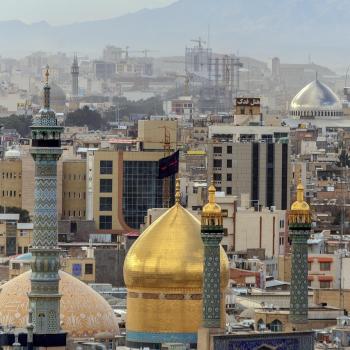
In all honesty, I hesitate to respond for several reasons:
1) I can only imagine the vitriol that will come from those who support the actions that took place in DC and the capitol building yesterday (the same sort of vitriol that all too often runs rampant on social media platforms making a mockery of the Gospel and our Christian witness). I hope and pray that I may be wrong but it is my conviction that the vast majority of them will not listen to any rebuke or criticism. Instead, they will provide ample “reasons” justifying yesterday’s actions. In light of this, I ask, is such criticism wise?
As a result, I offer this critique not for them so much but for the rest who may have “ears to hear.”
2) I also hesitate to respond because it only seems to feed into the narrative that America is God’s country and we need to preserve it and the freedoms it allegedly offers. I radically disagree with this sentiment and find the irony of this statement grieving.
The actions of many yesterday undermine the integrity of this nation and its democratic principles. Mitch McConnell (R) said it well when he noted that if we allow the actions of a mob to overthrow the results of this election, Americans will never again accept the results of an election. Democracy, the very thing these protests were aimed to preserve, will have been replaced by mob rule.
3) Finally, I hesitate to respond because I believe that most evangelicals have a poor understanding (and often lack any real understanding altogether) of the Gospel, the kingdom of God, the mission of God’s people, and how justice and living in the world relate to current events. This means that there is either no biblical filter or a poor Christian filter through which they are able to assess what is transpiring and any criticisms. (This is actually the focus of my current series of blogs on justice)
The Church needs to be about the work of the kingdom.
Foremost among the many problems of yesterday’s actions is that they do not reflect the attitudes and attributes that are to characterize the people of God.
Most viewers in the US and around the world look at yesterday’s actions as pathetic and damnable.
But, if such actions are condoned by Christians as supposedly good and necessary, then what does that say about Christianity to the rest of the watching world–including the people next door?
Does it make the cause of Christ attractive to onlookers?
Now, as an aside, let me say that making the cause of Christ “look attractive to onlookers” can be misunderstood. There is a great sense in which Christ and the Gospel of the kingdom are attractive—especially for the poor, the afflicted, and the downcast. The Gospel offers the only real hope there is.
At the same time, the message of the Gospel is that we must deny ourselves and take up our crosses and follow Him (Mark 8:34). Not very appealing if you ask me.
When we focus on “making the Gospel attractive” we often distort the Gospel in the process.
When I speak of the attractiveness of the Gospel, then, I am referring to the transformed lives of the people of God. The Gospel is attractive when the world sees Christians caring for the ill and those in need, promoting peace, and advocating for justice. Sure, advocating for justice includes standing up for injustice also!
(this leads us to the question as to whether or not the election results were a matter of injustice. Now, we are not going to solve that question here. I would only add that it since the election officials in every state—many of whom are Republican or right-leaning—have authenticated the results, since over 60 lawsuits were filed and rejected by the courts—many of whom are Republican or right-leaning—and since most Congressional leaders, including most Republicans, have affirmed the results of the election, the results appear to be validated. Now, I recognize that many will continue to dispute this).
Nonetheless, my question becomes: Is this the way Christians are to go about protesting?
The answer is emphatically, no!
Now, some might say that those who climbed barricades, stormed the Congress building, fought with officers, and behaved like vigilantes, were not associated with the Church.
The problem is, however, that this is not what most Americans and the rest of the world think.
After all, it is well known that Trump’s major support has come from the evangelical right. It has been prominent evangelical pastors and leaders who have continued to support Trump. Thus, as far as most are concerned, the actions yesterday were those of far-right Trump loyalists, which many consider to be largely composed of evangelicals.
The fact that this is true confirms that evangelical Trump supporters have not done enough to disavow themselves from the militant, far-right Trump loyalists.
Let me be clear. I am not saying in the least that you should not or cannot support Trump. I am saying that siding with actions, such as those that took place yesterday, makes a mockery of Christ and the church.
The work of the kingdom includes crying out against injustice
Let’s take for granted here that evangelicals and others are on different sides of the aisle as to whether or not an injustice has occurred in the recent US presidential election. That is what it is.
The questions become:
- How are we to cry out at injustice?
- What does crying out at injustice look like?
- And why are we not crying out at the many other forms of injustice in the US and the world?
Let me address the last question first. I must divulge here that just the other day I was prepping for my posts on my current series on justice and I chuckled to myself after realizing that many evangelicals will look at the title of my recent posts, all of which have “justice” or “injustice” in the title, and shrug them off as some liberal rhetoric—even though to this point I have only been addressing the issue of justice and Scripture.
It is quite hypocritical to contend that we must speak up against the election fraud and yet have disdain for many of the injustices that pervade our nation and our world.
I find it ironic that evangelicals often have contempt for justice and justice-related discussions, yet, they are quick to defend Trump and his allegations of voter fraud and rigged elections on the basis that Christians must stand up for injustice.
Sorry, but you cannot have it both ways. Either the people of God are called to speak up for injustice or we are not.
If we are called to speak up, then where are the far-right Trump loyalists when it comes to the many issues of injustice that riddle our society? Why are they not speaking up for immigration reform? For the injustice, let alone inhumanity, of separating children from their parents? Why are we not speaking up for the injustices against women and people of color that are a fabric of our society?
The fact is that the people of God are called to speak up for injustice everywhere.
When it comes to unjust election processes, I dare say that most evangelicals have no awareness at all of the election fraud that has ravaged Belarus as a result of last August’s “election.” If we are so set on “democracy” and speaking up against injustice and voter fraud then why are we not even aware of, let alone protesting, the trampling of democracy in Belarus?
And what about the arrests of democracy advocates in Hong Kong? (See my comments about the protests in Hong Kong here).
The failure to speak out against global injustices and on behalf of the oppressed everywhere demonstrates that we are only concerned about injustices and oppression when it affects ourselves—which is the antithesis of what it means to be a follower of Christ.
As for the question, “what does crying out at injustice look like?” allow me to reiterate that the problem with yesterday is not that it is wrong to protest injustice. The problem with what happened yesterday is that this is not how Christians are to protest injustice.
Are we more concerned about freedom or the advance of the Gospel?
Finally, maybe Trump is the savior of American democracy. Maybe Trump is the one person who can stand up to the establishment and bring change. Great. Maybe you were right in voting for him.
The problem is that the evangelical’s wedding of themselves to Trump, whose character is seriously flawed, and who betrays the actions and attitudes that should reflect the cause of Christ, and the evangelical approval of such actions has done serious harm to the cause of the Gospel.
I can assure you that the stigma that has been given to the evangelical church because of its virtually unquestioning support of Trump over the last several years is much more serious from the perspective of the kingdom of God than the supposed threats to our freedom.
After all, the kingdom of God often flourishes in countries where there is little freedom.
If you want to support Trump and his political ambitions, so be it. But you must not endorse his conduct. Nor, should we be supporting the violent protests of a mob.
We, the Church, must step back and be more concerned about Christ and our witness of Him.
















